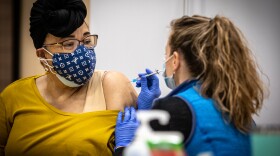Michiganders aged 18-64 with disabilities are currently in group 1C in terms of priority for the COVID-19 vaccine. Disability rights activists are asking the state to move them to group 1B, along with the support staff and other people who provide them care.
In a letter to the governor and the Michigan Department of Health and Human Services, the Michigan Disability Rights Coalition asked Governor Gretchen Whitmer and Michigan Department of Health and Human Services director Elizabeth Hertel to consider moving the group.
The letter cites the World Health Organization's classification of those with disabilities as being one of the most disproportionately impacted groups by the pandemic.
Laura Hall is the program manager for the coalition. She says getting the vaccine sooner could be life or death for many Michiganders with disabilities.
"I know they’re expecting to get to category 1C by May, but that is also a really broad group," she said. "So in the meantime, you know, I think we’re looking at more sickness and more death."
Also lacking, she says, is the data collection on how the pandemic has impacted people with disabilities. Hall says she's not impressed with the job the state's done thus far.
"So we know there are some particular groups that are more likely to affected than others. I don’t think that they have done enough data collection on people with disabilities, on the diversity of our community."
That diversity among those with disabilities also makes crucial to make actually getting the vaccine accessible. For example, Hall says, transportation to a vaccination site could be an issue in and of itself.
"If the rollout for the vaccine involves going in your car and waiting in line for several hours, that sometimes isn't accessible for people with disabilities who have to use public transportation," Hall said. "You know, you can't ask a paratransit driver to wait in a line for two hours while you get your vaccine. We're looking at ways the vaccine can be brought to the community as well."
The vaccine being available close to home is crucial for accessibility, Hall says. Also important is having assistive technology and people who are knowledgeable about disabilites at vaccination sites, to smooth the process along.
Having support staff and caretakers be vaccinated as well would also be a huge step towards protecting people with disabilities, Hall says.
"In my situation, I have someone that comes and helps me get out of bed, get in my wheelchair, take a shower for the day, cook meals, anything that I might need. And so if she gets sick, that puts me in a really dangerous situation because I have to have such close contact with her," Hall said. "And she also works for other people with disabilities in their own homes, so we have to keep our bubbles really small to keep ourselves safe." She adds, "It's problematic too because direct home health care workers also receive low wages, and it often doesn't afford people health insurance, either."
Want to support reporting like this? Consider making a gift to Michigan Radio today.





